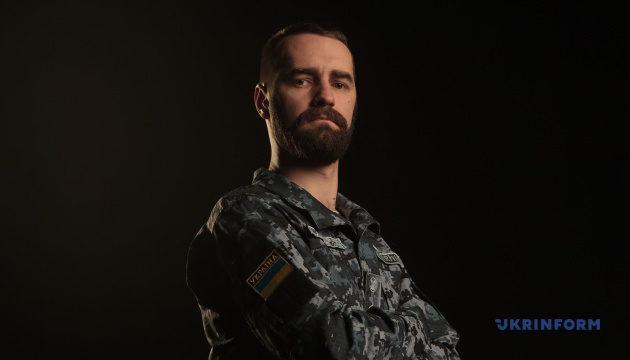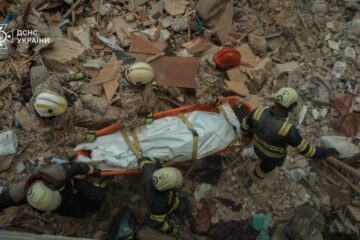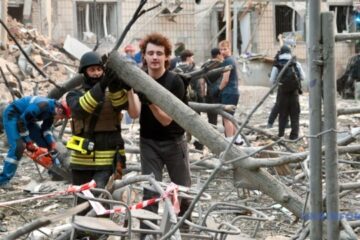How did the full-scale Russian invasion at sea begin? How was the rescue of the Ukrainian personnel deployed on the Zmiiniy (aka Snake) Island carried out in the first days of the war? What has changed fundamentally?
Mykola Shcherbakov, ship commander, Maritime Guard, the State Border Guard Service of Ukraine, began his military service in 2018 and has been defending Ukraine’s borders at sea since then. Behind his shoulders are years of experience participating in multiple combat and rescue operations, including particularly the evacuation of Ukraine’s military personnel from the Snake Island, when his ship and crew entered into direct confrontation with the Russian Black Sea Fleet flagship – the cruiser Moskva.
For this Victory Commanders series interview, Ukrinform invited Mr. Shcherbakov to discuss his service defending Ukraine’s maritime borders, what it is like working under enemy fire, the teamwork strength, and the future of the Ukrainian Navy.
[embedded content]
– I heard a saying that goes “the sea does not forgive silliness”. Is this how this rule works in general when dealing not only with the elements, but also with the Russian enemy?
– Yes, indeed. The sea is an element, a harsh element. When you go out into sea and the weather is good, it really lulls you and it seems like it is like a gentle animal, you know. But this is very deceptive, and I have seen with my own eyes how everything can change dramatically in a matter of hours – stormy conditions occur and the price of a mistake increases significantly. This does not mean that every mistake ends up in a tragedy, but of course – it is a big risk and this cannot be allowed, you must always be prepared for the worst.
And of course, before each going out into high sea we check all systems, all mechanisms, the crew must be prepared to operate in whatever conditions arise. Needless to say, the human factor in the form of an armed enemy only exacerbates this situation, because you have to confront not only the elements, but also human intelligence, human cunning, and sometimes you yourself have to be smarter and more cunning.
– Why did you decide to choose the military career and why the sea?
– Let me start by saying that I have no naval education background at all. In 2018, I graduated from a civilian university and decided that I had only wo options to choose from: either to go serve on conscription in an armed service I will not be free to choose, or to choose myself where to serve, under contract. And I opted for this particular naval specialty, because the sea is always fascinating, it is romantic, and after all, it is a beautiful uniform, which was important to me back then. So I joined the unit where I’m serving now, because it is river-sea-going ship, there is probably no such thing in Odesa or Mariupol. Besides, I grew up on the Danube River, this is my native land, I’ve been here since childhood; in some locations, I know every bush, every island, for me it was important. It means to be somewhere closer to home. So that’s why it’s like this.
– This romance that you’re talking about, how is it perceived now, when the sea is dangerous and, perhaps, we can say that you’re fighting to return peace to the sea and return that romance?
– Yes, this romance may have faded to a degree, but it’s still there. I like going out very early, although my guys like sleeping longer, you know, I like to go out to high sea at four or five in the morning, because meeting the sunrise over the sea is very beautiful. Every time it’s something new, you know, new landscapes, new colors. Again, the sea is gentle, and it always makes my heart feel warmer.
And of course, during the war, we must not forget that enemy air attack assets may be deployed somewhere in the vicinity, and somewhere there may be deployed some naval component, sea mines, it has not gone anywhere and probably will not go away for a long time. Even after the war ends, no one should completely fall into romanticism, because mines are there to remain for a long time, unfortunately.
I joined military ranks in 2018, in April. And as soon as in January [2019], it seems, a mine situation occurred on the Danube. In the area of the settlement of Reni, or even a little bit up the river, in Romania, mines dating to the First World War surfaced. There was a flooded ship base there, and these mines – after 100 years – were still dangerous. They surfaced and our guys towed them to safe places, away from populated areas to prevent casualties. That is, the echoes of the war will last a long time, unfortunately.

– You encountered the full-scale invasion while at sea. Would you tell us how it was?
– For us, it all started at about half past one on February 24. We received a signal to be on the highest alert level, and then, about half an hour later, we were given the order to exit the base and sail downward, closer to Zmiiniy Island. At that time, this was not yet announced, but there were already rumors going around that our task would be to evacuate personnel from Zmiiniy Island. So we sailed downward. Around four in the morning we arrived at the destination, the crew lay down to rest, and around 5:30 we received a signal over the radio announcing that war had begun. Of course, this was the first combat alert; the crew was gathered and briefed about the situation that I was aware of by that time – unfortunately, it was not too much information about what was happening, but at least something. Basically, the crew probably understood in advance that something would happen. Perhaps someone expected that it would not be that sweeping, confined to some provocations at sea, or suchlike. One way or another, we were preparing for this and knew that something would happen, sooner or later. Even so, I could read in the eyes of my crew that their families were left behind, and there was such uncertainty, you know: what would come about, what would happen to the families? The crew I had was a mixture of youth and experience, so I called on the most experienced ones to keep an eye on the “yellow-necked ones” so that we could act coherently, so to speak. And initially, I always organized watches in such a way that there was one seasoned sailor and one young one. One-on-one care, communication, so that no stupid thoughts would enter your head, etc., and this was vital psychologically.
– You mentioned Zmiiniy Island. Actually, despite the aggressive actions from the cruiser Moskva, you were able to successfully evacuate personnel from out there. Could you elaborate how did you manage to do it?
– At some point we get an order to sail to Zmiiniy Island for an evacuation mission. Two civilian search and rescue vessels were sailing alongside us for the same mission. We arrived at the destination, not without incident, unfortunately, we had an emergency situation – one of the main engines, the cooling system of the main engine failed, we lost part of the speed, let’s say, lost the ability to quickly maneuver, we were just equal in speed to these search and rescue boats, and so we reached the island simultaneously with them.
On the way there we crossed paths with the cruiser Moskva, the visibility was poor, about 6-7 miles (that’s about 10-12 kilometers), and this giant falls out of the clouds. It was unusual. True, the ship was beautiful, I must admit, and at that time, not to say that it was scary, but the sensations were extraordinary. And we received a message over the radio, on international security channel, saying: “…I am a Russian warship.” And the most crucial moment was the negotiations with Moskva, we told them that we had arrived to evacuate personnel. Their response, let’s say, was positive one, and so we went on to fulfill our mission.
And upon arrival at the island, we experienced some lack of coordination. In the first days, there was some chaos in coordination between different units, and unfortunately, we had no contact with the defenders of Zmiiniy at that time. So back then we managed to evacuate only the civilian workers who were deployed there – the lighthouse maintenance service, the geographical service, etc. They went over right to the search and rescue boats, we provided cover from the side of the island during the entire process. We agreed with these search and rescue boats that the rescued personnel would then be relocated in batches to our ship.
Unfortunately, evacuation of military personnel did not take place at that time, I was unaware of the reason for a long time, nor do I know it now for sure. There are some rumors going around, interviews with some defenders of Zmiiiniy, from where I understand that they might have refused themselves. Because the requests and appeals coming from the cruiser Moskva were not about an honorable surrender. They rather meant that we had to abandon our weapons, which is a shame for a soldier, and it was perhaps because of this that the guys did not go and stayed to defend the island, their positions.
And after the mission was completed, we returned to the base station, because we had to bring the ship back to operating condition. We arrived at midnight, that is, the guys had been on their feet for a day, and credit to my motorists and mechanics – they made repairs in a matter of minutes, which, as a rule, take at least several hours, sometimes even several days. So we got back in formation and continued with the missions at hand.

– Another significant development was when you managed to rescue our soldiers deployed near Zmiiniy Island on September 14. Tell us what happened then and how you acted?
– At that time, we were on combat missions, we had tasks that were not very typical for us at that time – pilot ship operations, because Zmiiniy Island had already been recaptured, the grain corridor had been opened, and ship traffic had resumed. And after a pilot boat got exploded in our area, we had no such vessels left, so we had to perform these tasks, providing transportation for ship pilots, etc., and so we were operating nearby a populated locality. Well, at some point I got a signal that the guys from neighboring units had experienced a disaster while at sea, they had a problem with the boat, it sank, and by some miracle they had a rubber boat, which they somehow inflated and climbed into. And as it turned out later, they were at sea for almost a full day, and they were miraculously able to catch the connection (relying on “convex sea eye”, as a saying has it) and report their location. There was Zmiiniy Island somewhere in sight, they gave the distance, an approximate bearing, somehow oriented themselves by the sun, and I got an order to go out and conduct a search and rescue operation. My boat had never gone that fast before, considering that there are certain rules of good manners – when nearing populated localities, you have to slow down a little bit so as not to disturb the coastline, not to hit private boats. But then at stake were human lives.
We went out as quickly as we could and after 40 minutes we reached the destination and began search operations. Calculations were made, we calculated, as they say, by which way the wind was blowing. And this is not a joke, this really needs to be taken into account at sea, because drift affects, and then there was a westward wind blowing, so the guys were slowly drifting away towards Zmiiniy and towards Crimea. All the calculations turned out correct, we discovered the boys almost immediately, lifted them on board and brought them home.
– It’s an amazing story, really, how it turned out. You mentioned “convex sea eye “. What does that mean?
– We use this wording when giving some data approximately; this skill is worked out through practice and experience over the years. We constantly have to work with numbers, such as bearing and distance. Bearing is analogues to land azimuth, which is the direction to the target relative to the north. And for the distance to the target, the guys report to me so that I have an idea – where everything is located, and I then communicate the target data to my gunners so that they can orient themselves – where, from which side to expect adventures. Therefore, this “sea eye” skill is gradually being refined, and after years of practice and experience you can already accurately calculate a distance to a target at several kilometers or miles away.
– Regarding search and rescue operations or, perhaps, any others. Have you had to perform them in rough seas?
– The weather was good on the day of the operation. But before the war, I had a kind of “practice run” of all these developments, as is said.
During the international exercises “Sea Breeze” in the Black Sea, I didn’t yet hold officer rank back then, serving as assistant boat commander – the same one on which I met the war, but there was no commander back then. I was serving as temporary acting commander when I had to perform the search and rescue operation, but already in very rough sea. For all I know, our paratroopers were supposed to practice landing on Zmiiniy Island, but stormy weather and strong winds blew one of these paratroopers off the designated route, and he fell into the sea. And he stayed there, as far as I remember, for about an hour or an hour and a half. He was lucky that it was July, although the weather was not like summer. This paratrooper is very strong, he easily endured these one and a half hours in cool water, among high waves, etc. And then we managed to rescue him too. We were lucky then, you could say. I wasn’t that experienced back then, it was my first storm like that. And other vessels were also searching alongside us, so we knew – if not us then someone else would discover and pick him up anyway.

– But, perhaps, to say “lucky” is a bit modest?
– That, as they say, not without luck. When at sea, you anyway need something to help you a little sometimes.
– You belong to the generation of commanders who arose during the Great War. In your personal opinion, what shaped you the most as a warrior?
– Responsibility, probably. Responsibility for completing missions – in the most effective way and with the least losses possible. Fortunately, I did not have to, and, hopefully, will never have to encounter the losses of a subordinate from my team, but I always think about it. Before each operation, I take into account possible options, how I will act in a particular situation, how my subordinates will act, what orders I will give. It is this responsibility that hardens you, because you understand that you are not only responsible for yourself, that you have subordinates who have families, children, and I will have to look into the eyes of their families should something bad happen to them, especially something for which I will be to blame. Therefore, you have to get prepared, prepared a lot.
– You exercise command over a special-purpose crew. What is the specifics of managing a team like that?
– It’s not quite so; the ship is of special-purpose, but the crew is like others in general. Yes, these are more professional people, of course, the best were selected for these positions, but the ship is supposed to perform basically the same missions as a regular ship. But we have to do it faster, more efficiently, our response time is shorter, so I would even say that it is easier for me to work with these guys, because they are professionals in this field, are not random people.
– Regarding the response time, what duration are we talking about, that is, how long will it take you to be ready to carry out the order?
– It depends on the mission at hand and the readiness status in which we are at the mission time. Because we can well be elsewhere undergoing maintenance… If we are on duty, the response time is measured in minutes. If the mission is to repel an enemy attack, then it is 1-2 minutes during which we must be on the alert, in the state of high readiness to act.
– Tell us how you organize communication within the crew and at critical moments in particular?
– We have service regulations, we have ship instructions. Everyone, as in any crew – in particular, a tank or an armored personnel carrier – are cogs in one mechanism, everyone must know their place, everyone must know what they must do while performing a specific task. And, of course, we intercommunicate using standard means. And yes, of course, sometimes you have to deviate from the written regulations somewhere, somewhere to scold on or whisper to someone – so that they rally and do what I demand them to do.
– Are there any special successes achieved by your crew that you are proud of most?
– Actually, I am currently serving in a newly formed crew, in the same one, on the special-purpose ship. Perhaps the greatest success achieved so far is mastering this new technology, and we did it very quickly. Literally in a month’s time we were already in the ranks performing tasks on an equal footing with others. Although it was a completely newly organized crew, it was formed as a “motley crew”, and I had to bring this all together, get it glued, so to speak, into a single mechanism. But we did it very quickly, and we are ready for any task that may arise.

– As you know, there are lots of superstitions and traditions in the maritime community. Do you have any superstitions, let’s say, that you adhere to, just for good luck?
– In fact, there are many traditions and this is more of a tribute to traditions. Sailors like saying that “we have always had it like this”. For example, when we exit the base station, I give a signal, and when we return to the base, I also give a signal – it is a kind of farewell ritual, and vice versa – greeting our comrades who stay at the base waiting for us. And for many, these are also families who live in the same city, it is important for them. And in the crew, if a person has some kind of lucky T-shirt or talisman – it is wonderful, because this reflects their psychological state, this is how they support themselves in harsh moments. And I only favor this.
– Maybe there are some other traditions that you like the most, the one specific to the maritime community?
– We have a ritual, for example, called “the birth of a sailor” – this is when a new member of the crew joins. So when we first go out to sea with him, we give him a full glass of sea water, salty, and he has to drink it, preferably without spilling a single drop. I always tell my guys: remember this taste for the rest of your life, and you don’t have to drink this water again. Remember this taste when you ever want to take a nap on watch or be careless about your tasks, because this taste may be the last thing you will ever taste in your life.
– And I understand that you also went through this ritual?
– Of course I did, twice.
– Why twice?
– Because I started my service as a sailor on a light boat, and then, when I transferred to serve at a first-rate ship, my commander, he was so very cunning, he said that it didn’t count and that I had to go through this ritual on the first-rate ship as well. That’s why I had to do it twice.
– And how it was?
– You know, actually, it’s not that bad, our Black Sea – it’s so soft due to that.
– You mean the taste?
– Yes, because somewhere in the Mediterranean Sea – the water is very salty and even bitter, so it’s more difficult out there.
– If we talk about the sea, are there any paradoxes here, like I can’t swim, or something like that?
– It so happens that a person can’t swim, but goes to be a sailor anyway. I always say that it’s very good, because you will fight very well for the survival of the ship. And there were instances where a person went out to high sea for the first time, and he got seasick and couldn’t swim at that. He felt bad, he had to hang over the moorings – this is a kind of fence for the safety of the personnel, so that no one would be washed overboard, no one would fall out. You have to hang over and “feed Ichthyander”, as is said. So he was simply put a life jacket on, tied with a rope to these moorings, so that he could stay there peacefully and we didn’t worry that he would be washed away somewhere while he was nauseous. So it happens like that.
– When you learned that the cruiser Moskva had sunk, what were your thoughts, feelings?
– We reacted quite calmly, because we understood that this was a war. Of course, it was somewhat joyful, because we had some personal scores with this ship, remembering the first day, but we understood that, to be honest, this would add us more work to do. Moskva used to be providing air defense covering over the Black Sea, creating a kind of protective umbrella for its naval aircraft operations. Indeed, it became much safer for us, because nothing was flying over our heads anymore. But I understood that the situation around Zmiinyi would definitely escalate, and adversary provocations would take place anyway, and we would have to perform lots of exciting tasks.
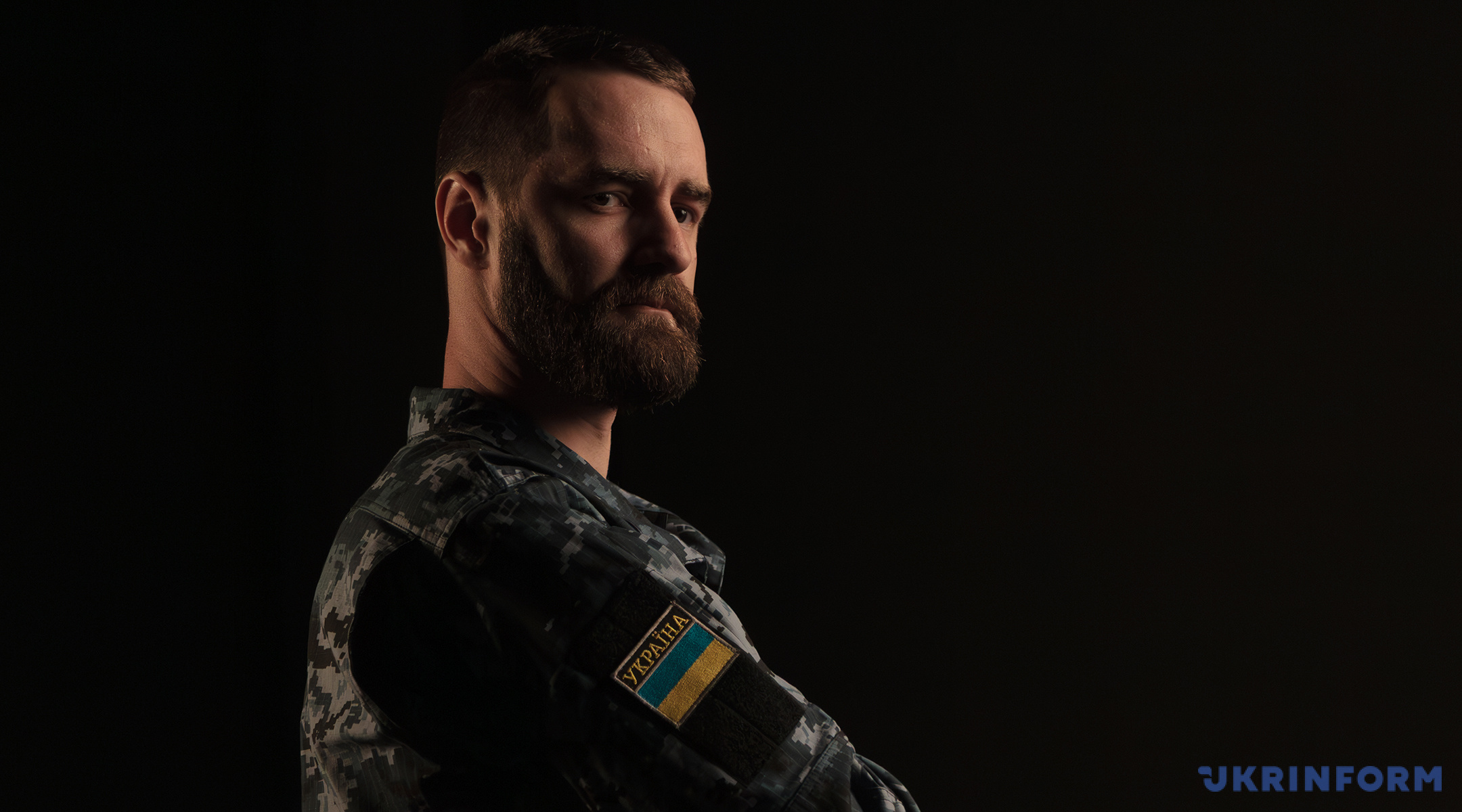
– So it happened. Did it add you more work to do?
– Yes, it did add. There were a lot of tasks of advanced level of difficulty, but maybe I’ll tell you next time, now is not the time yet.
– After the victory, definitely.
– Of course.
– Basically, Ukraine has showed incredible results in sea warfare. Not having a naval fleet of its own, it managed to send more than one Russian ship to sea bottom after the cruiser Moskva. Naval drones began to operate. What is your assessment of these results and of the drone technology development in general?
– Here we must pay tribute to our guys, to their intelligence, their imagination, their ingenuity, because, indeed, Ukraine is now at the forefront of the use of unmanned systems at sea. This is something that we did not expect in the first weeks, months, but, as it turned out, someone thought about it and brought these projects into reality. And now we see that this technology is getting better and better. Some modifications armed with air defenses are already coming into operation, either as a small aircraft carrier carrying FPV drones, or a fixed-wing reconnaissance drone, etc. Ukraine has distinguished itself on the world stage with its naval unmanned systems.
– In your opinion, how should maritime drone technology in our military develop in general? And the Ukrainian Navy of the future, how do you see it?
– We need more automation, more unmanned systems, for ensuring security at sea in particular, because not all of our tasks require people on board. Of course, when you have to perform purely our work, like, for example, enforcing law at sea, then you have to deal with local population, you have to record offenses, draw up administrative protocols, etc. No drone will replace you here. And if you need to get somewhere and do some reconnaissance, have a look at something somewhere, then it would also be nice to have your own naval drones. And in general, the Navy… The Navy is always a very expensive luxury, so I believe that such small platforms with some kind of modular weapons, missiles, air defenses, etc., support with drones are the way to success. The example of Moskva showed that a large ship in the Black Sea is an easy target. Thus, you need to be small, fast, maneuverable. I think that swarm tactics are what awaits us in the future.
– Our guests for this series of interviews share one thought: Despite the fact that the war has brought with it terrible things, but it simultaneously brought together wonderful people with whom, perhaps, one would otherwise never have met under other circumstances. Do you have to tell us any unique stories of comradehood which will remain in your memory forever?
– Many new comrades from Mariupol joined us. These acquaintances have become very important, because the guys have real combat experience. Yes, maybe they are not experienced in maritime warfare, but they went through hell, and they have something to teach, to share their experience. And we have a lot of such officers who are really proficient in their job. And, let’s say this, on the personal front, the war also brought me together with my love, because my girlfriend is from Mariupol, and it was because of the war that she ended up where she is, and we met.
– But not married yet?
– No.
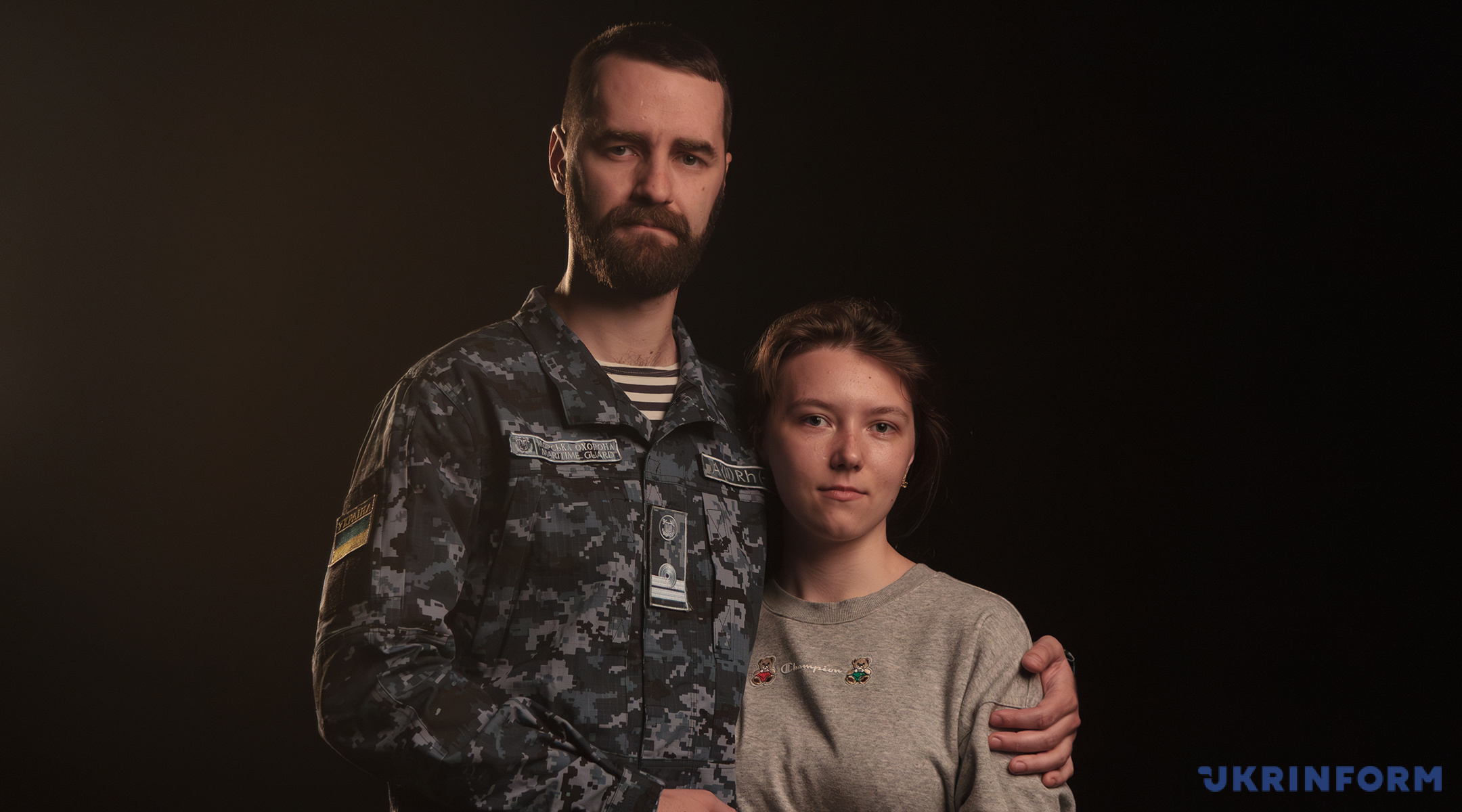
– Will you propose?
– Of course I will, it’s all in the process.
– Well, I thank you for your sincerity and for sharing this incredible story. Indeed, love during wartime is inspiring, it shows that life actually continues. And I wish you to preserve this love over the years and, perhaps, you will invite us to your wedding ceremony someday. Our interview is slowly coming to an end, and we maintain such a tradition – these are rapid fire questions. Ready?
– Yes, let’s try.
– War for you – is?…
– It’s grief.
– What can you never forgive?
– Betrayal.
– What thought do you wake up with?
– Today will be better.
– Can one person change the course of history?
– Yes.
– Your biggest fear in life?
– The death of subordinates.
– The best and worst day in your life?
– The worst is, of course, the beginning of the war, and the best, I think, is yet to come.
– What is the greatest reward for you?
– I don’t even know, I don’t chase for awards, to be honest.
– What does independence mean to you?
– It’s freedom in your actions.
– What will be the first thing you do after victory?
– I definitely won’t get drunk. I’ll probably go on a trip around Ukraine.
– Well, it’s a wonderful dream, and we believe that it will definitely come true.
Diana Slavinska led this conversation
Photo: Kyrylo Chubotin
Source: Mykola Shcherbakov, Ship Commander, Ukraine’s Maritime Guard

